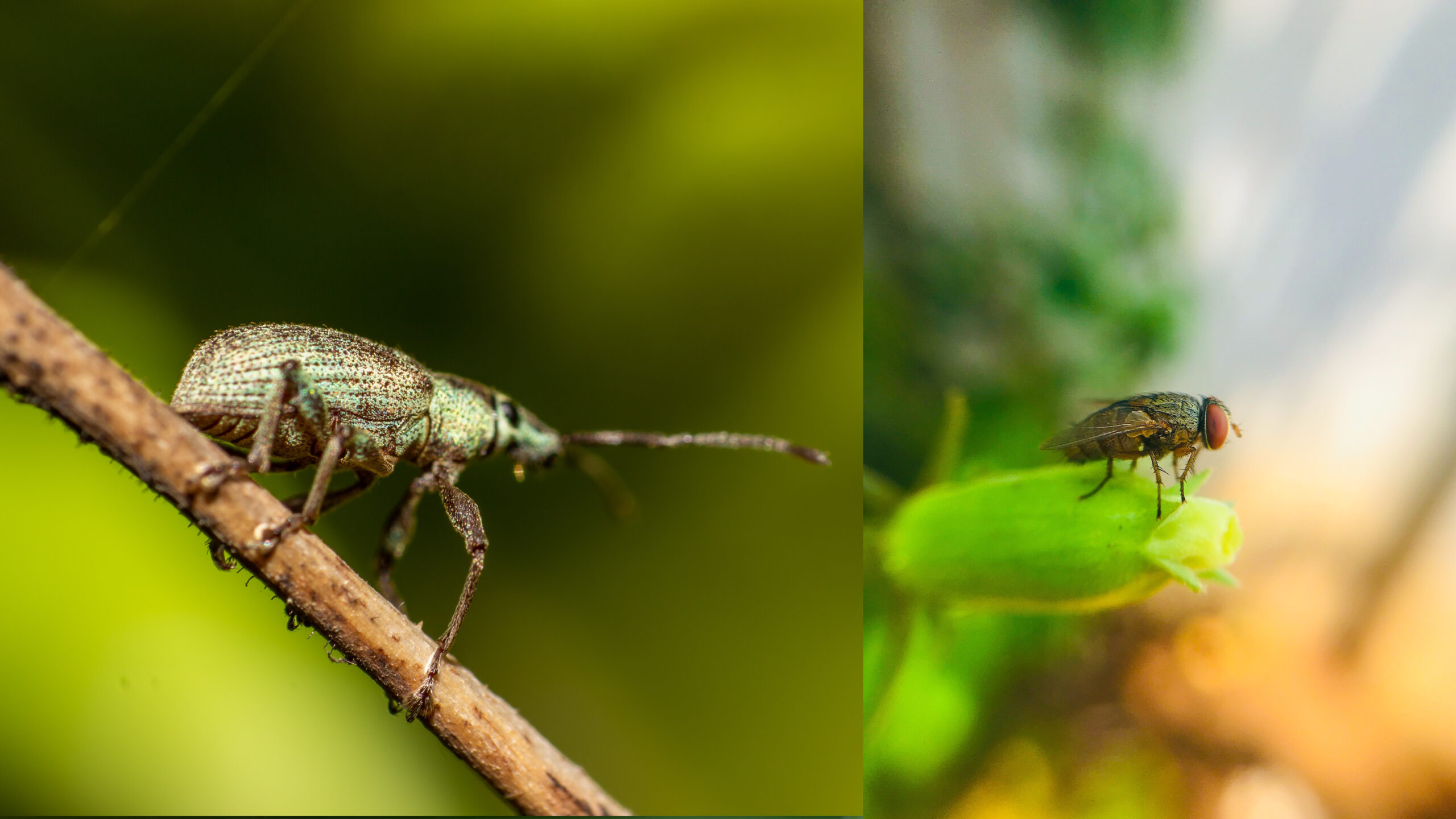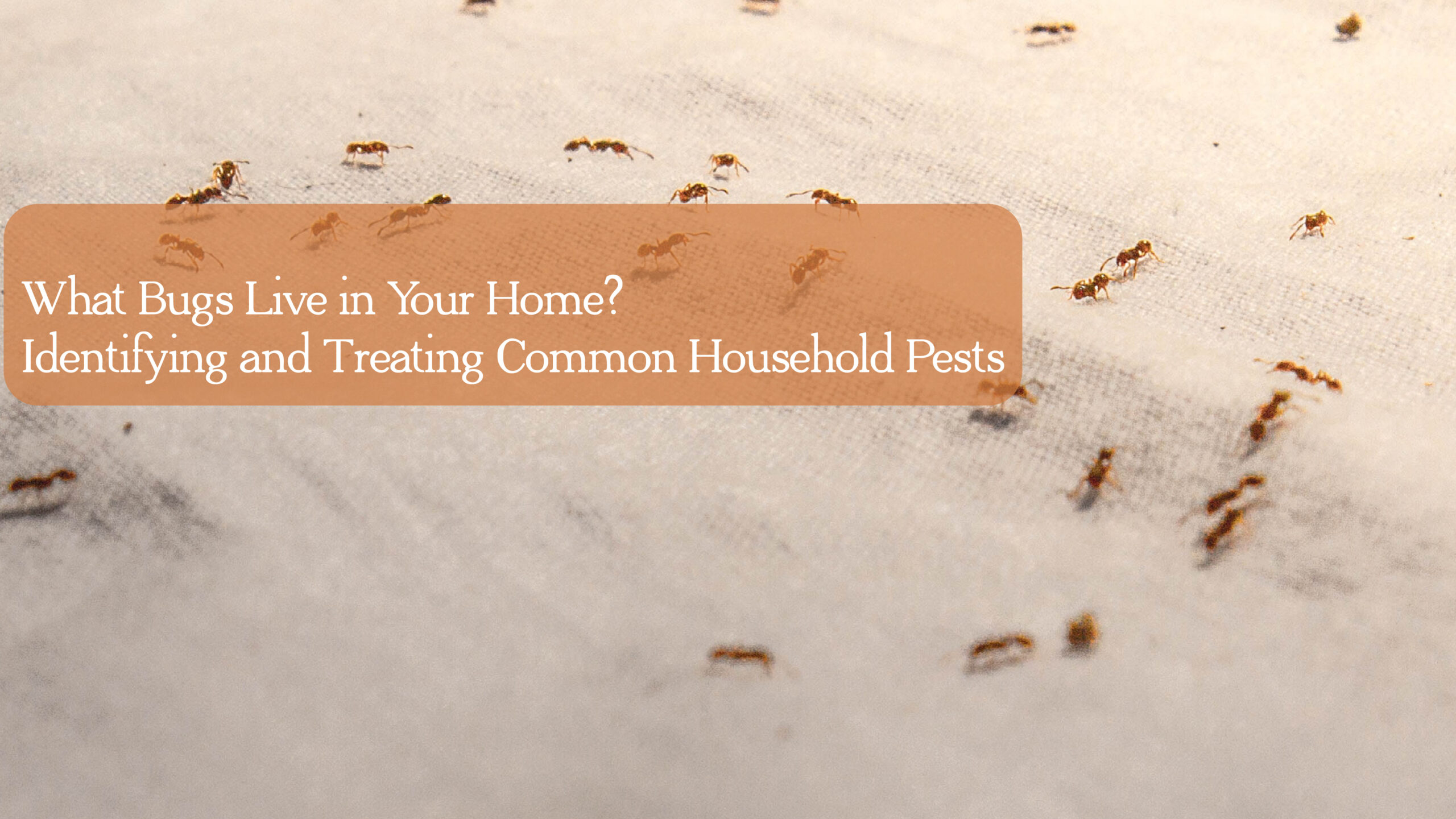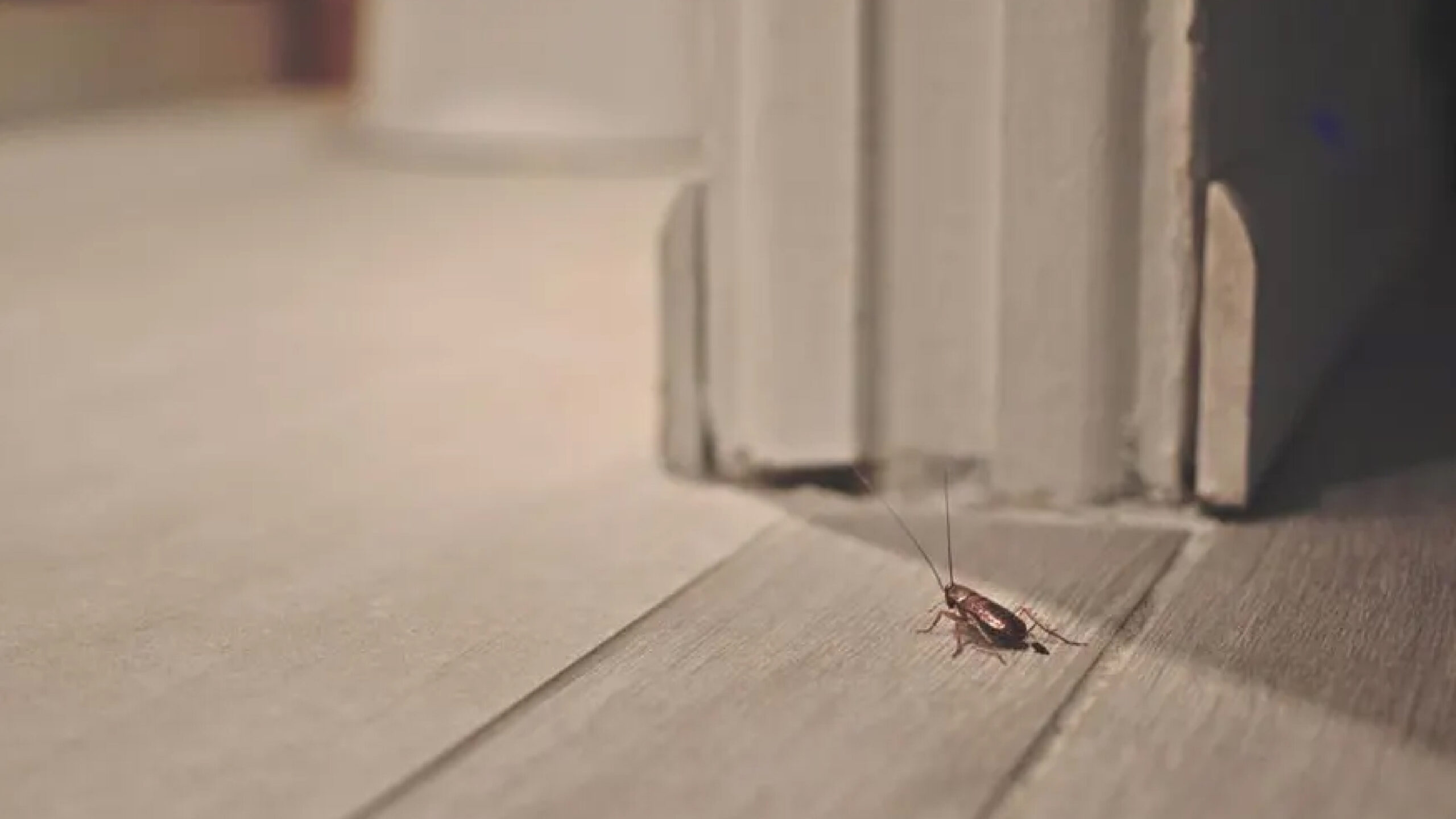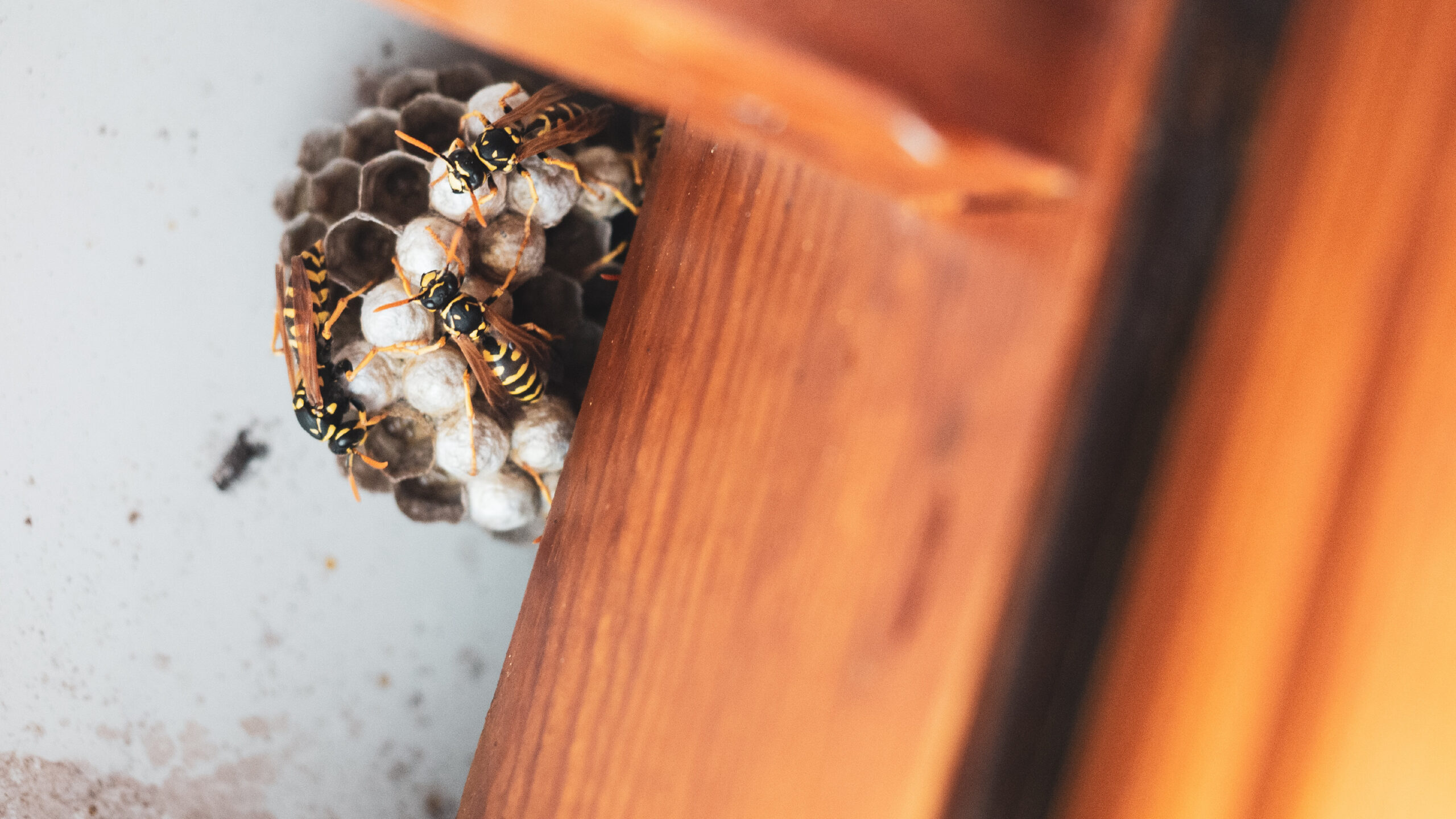
What Bugs Live in Your Home? Identifying and Treating Common Household Pests
Understanding Pests

Know your home pests. Knowing what bugs may cause problems and how to spot and stop an infestation might help you avoid pests. In this detailed tutorial, we will discuss the most common pests and how to efficiently control them.
Wood-Destroying Bugs
Wood-destroying bugs threaten your home’s structure. Two common culprits:
Termites
Termites silently destroy wood. Their “silent” action can go undiscovered until major damage has been done. Look for mud tubes, brown discoloration, blistering paint, loose siding, droppings, or sawdust-like particles. To prevent home damage from termites, get professional help immediately.
Carpenter Ants
Carpenter ants, though less destructive than termites, can damage your home’s wood. Carpenter ants dig galleries into wood to build nests, unlike termites. Basement baseboards are especially susceptible to carpenter ant infestations. Look for sawdust-like particles, wall rustling, or ant trails.
Cockroaches—Unwanted Houseguests(Bugs)

Disease-carrying cockroaches are a nuisance. They prefer busy cities and apartment buildings for food and waste. These resilient bugs commonly infest new rooms on used or rented furniture. Cockroach prevention is crucial. To deter them, keep the area clean, cover cracks, and remove food and water.
Pests:
Annoying but Safe
Some pests are harmless, yet they can still cause stress. Let us examine some common ones:
Mosquitoes
Mosquitoes spread dengue, Zika, and West Nile viruses. In warm, humid climates, they breed in standing water. Reduce standing water near your home to avoid breeding. To prevent mosquito breeding, empty outside water containers, unclog gutters, and ensure good drainage.
Bed bugs
Urban bed bugs can spread through furniture, clothing, and humans. Nighttime bloodsuckers leave itchy welts. Pet owners should be on the lookout for these pests, which are tough to eradicate. For efficient bed bug treatment, visit a professional pest control agency.
Fleas, ticks
Ticks and fleas plague pet-owning households. Fleas can itch and ticks can spread Lyme disease. Check your dogs for these little hitchhikers and take precautions. Use tick and flea preventives and groom your pets to reduce infestations.
Rodents: Pests
Bugs are not the only pests. Mice and bats can potentially invade your home, causing troubles. Explore these two frequent types of bugs:
Mice
In winter, mice seek warmth and food. Seal any entry spots in your home because they can fit through tiny spaces. Mice contaminate food, chew wires, and carry diseases, making them undesirable guests. To keep these furry pests out, catch, clean, and seal your home.
Bats
Bats inhabit attics and chimneys. Rabies-carrying bats suppress insects. If you suspect a bat infestation, call a professional. Bats are protected in many places, therefore eradication must be done properly. Professionals may securely exclude bats from your property while conserving them.
Geographical Pests

Local pests vary. Some examples:
Humid Tropical Regions
Mosquitoes flourish in warm, humid climates like Florida. Reduce standing water and repel mosquitoes. Screen windows and doors to keep pests out.
Wooded Areas
Spiders, ants, and beetles live in woods. Prevent pests by inspecting your home regularly. Seal crevices, trim vegetation, and utilize obstacles to prevent ingress.
Desert Areas
Snakes and scorpions are desert problems. Protect yourself and your home by learning about local wildlife. To reduce desert-dwelling bug habitats, seal foundation openings, fix screens, and clean outdoor areas.
Types of Pest-Prone Homes
Some dwellings are more pest-prone. Consider these elements:
Log Cabin
Beetles, termites, and bees love log cabins. Preventing infestations requires regular inspections and preventive interventions. To prevent wood-damaging bugs, plug cracks and gaps, apply preservatives, and ventilate.
Brick or vinyl homes
Pests prefer wood exteriors to vinyl or brick. To prevent pests, seal entry points and examine often. Pests can enter through utility entrances.
Old Homes
Pests can enter older homes through cracks. Such homes have spiders and silverfish. Maintaining and closing gaps can keep them out. Check the foundation, windows, doors and other entry points regularly and fix any damage.
New Houses
Due to exposed wooden beams and moisture, newly built homes may have temporary bug infestations. Fungus beetles are very bothersome during this time. After drying, they usually disappear. Sealing gaps and utilizing treated wood reduces pest problems in new homes.
Outwitting Bugs
Preventing pests is essential.
Home Sealing
Window screens, sealing window and door frames, and addressing exterior entrance points will seal your house. To keep bugs out, caulk cracks and crevices. Pests may enter through utility pipes, vents, and cables.
Clean Exterior
Maintain your lawn, shrubbery, and trees. Pests hide and access overgrown vegetation. Pests should stay away from mulched beds near your home’s foundation. Pests avoid clean exteriors.
Water Pools and Drainage
Keep water away from your foundation. Clean gutters to keep water away from the house. Static water from clogged gutters attracts insects. To prevent mosquito breeding, remove birdbaths and containers.
Regular checks for bugs
Check for pests indoors and out. Look for droppings, nests, chewed wires, or other unusual indicators of infestation. Early detection avoids deterioration. Termite and rodent-prone areas need regular inspections.
Conclusion
A healthy and comfortable house requires understanding of pests. You can safeguard your home and family by learning about typical household pests, their habits, and preventative and control strategies.
Finally, knowing what pests could infect your home is the first step to controlling them. Knowing their habits can help you prevent infestations and safeguard your household.
Keep your home sealed, tidy, manage water pooling and drainage, and examine often. These preventive measures will keep bugs away and make your home pest-free, that gives you and your family peace of mind and comfort.
FAQs
What distinguishes termites from carpenter ants?
Carpenter ants have elbowed antennae and a narrow waist, while termites have straight antennae. Carpenter ants and termites degrade wood by excavating tunnels.
Cockroaches only live in filth?
Cockroaches live in clean places too. Sanitation prevents infestations since they like food and moisture. Cleanliness and food removal repel cockroaches.
Bed bugs?
Bed bugs hide in many areas. They infest furniture, cracks in walls, electrical outlets, and other small places. Prevent bed bug infestations by inspecting and cleaning hiding places.
How can I avoid mosquito breeding in my yard?
Remove birdbaths, containers, and clogged gutters. Maintain outside water containers. Use mosquito repellents and screen windows and doors to keep mosquitoes out.
What if I suspect a rodent infestation?
Seal entrance points, store food in airtight containers, and consider traps or a professional pest control service. Preventing rodent damage and health hazards requires immediate action.
When should I get expert pest control?
If you can not handle pests on your own or have a significant infestation, you may need expert help. Pest management experts can identify and treat pests. They can manage pests long-term using focused remedies.
Eco-friendly pest control?
Eco-friendly pest management exists. IPM involves habitat modification, exclusion, and tailored treatments to control pests while minimizing environmental effect. This method prioritizes prevention and non-chemical control.
Pests harm health?
Pests can harm humans and pets. Mosquitoes and ticks can spread malaria, dengue, Lyme, and West Nile viruses. Rodents spread salmonella and hantavirus. Cockroaches can cause asthma and allergies. Pest infestations should be addressed quickly to avoid health issues.
Pest inspections—how often?
Early pest detection requires regular pest inspections. Location, home age, and pest history affect inspection frequency. If you see pests, get a professional pest inspection annually or as needed.
Can natural pesticides work?
Integrated pest management uses natural solutions. Essential oils, vinegar, and diatomaceous earth repel or kill pests. For serious infestations, home therapies may not be as effective as professional-grade products. Before using natural remedies, consult a professional or research.
Preventing domestic pests is crucial. You can maintain your house pest-free and safe for your family by using efficient methods, inspecting regularly, and acting quickly.
What should I do if my home has pests?
To avoid a worsening pest infestation, act quickly. Take these steps:
Identify the pest: Determine its type. This helps you choose the best removal and preventive method.
Assess the infestation intensity and scope. Is it localized or widespread? This information will help you decide if you need help or can handle it yourself.
Treatment options vary by pest. Find the best solution. Use pesticides, traps, baits, or natural cures.
Prevent future infestations while treating the current one. Seal entry points, remove food and water, and clean up.
Read and obey chemical pesticide and insecticide directions. Protect yourself, keep children and pets away from treated areas, and ventilate.
Monitor the status after treatment of bugs. If pests return, reapply remedies or call a professional.
Can I avoid pesticides?
There are non-chemical ways to reduce pests. Eco-friendly tips:
Maintain a clean, clutter-free home: Clean behind appliances, under sinks, and in storage areas where pests may hide. Decluttering lowers pest hideouts.
Avoid pests by storing food in sealed containers. Clean food storage areas frequently and dispose of rubbish in sealed bins.
Seal pest access points: Check your home for cracks, gaps, and openings. Caulk or weatherstrip these entry locations.
Maintain appropriate drainage to avoid pests. Maintain gutters and address plumbing issues immediately.
Window screens keep flies, mosquitoes, and other flying insects out. Replace broken screens.
Use smells to repel pests. Peppermint and citronella repel ants and spiders. Planting lavender, mint, or rosemary around your home repels insects.
When do I need expert pest control?
There are times when a professional pest control service is best:
Severe infestations: Seek expert help if the infestation is extensive or dangerous. Professionals can tackle serious infestations.
Rodents and stinging insects are health threats. Let specialists handle these pests.
Rodents and stinging insects are health threats. For your safety and pest extermination, let specialists handle these pests.
Structural damage: If termites or carpenter ants have damaged wooden beams in your home, you need professionals to assess the damage and provide treatment and repairs.
Professional pest control services can also assist avoid future infestations. They can perform frequent inspections, identify vulnerabilities, and suggest pest-proofing methods.
Remember, professional pest control services can tackle difficult pest infestations. They can target treatments, protect your family and pets, and provide long-term pest control.
Pest control: how long?
The type of bug, infestation severity, and treatment approach determine how long it takes to eliminate a pest infestation. Minor infestations can be treated in days or weeks, but severe instances may take weeks or months to remove.
DIY pest control: effective?
DIY pest control works for minor infestations and prevention. For larger infestations, professional pest control is recommended. Professionals can exterminate pests and prevent re-infestations using their knowledge, experience, and specialized remedies.
How can I stop garden pests?
Prevent garden pests using these steps:
- Keep your landscape tidy and pest-free.
- Weeds hide bugs, so remove them routinely.
- Proper watering and drainage prevent pest-friendly damp situations.
- Control pests through companion planting, mulching, and beneficial insects.
- Check your plants for pests and act quickly.
- Maintaining a pest-free garden requires early discovery and proactive prevention.
This guide gives you the tools to detect common household pests, understand the behavior’s of bugs, and avoid and manage infestations. Staying attentive, implementing preventive measures, and getting professional aid when needed may keep your house pest-free and comfortable.